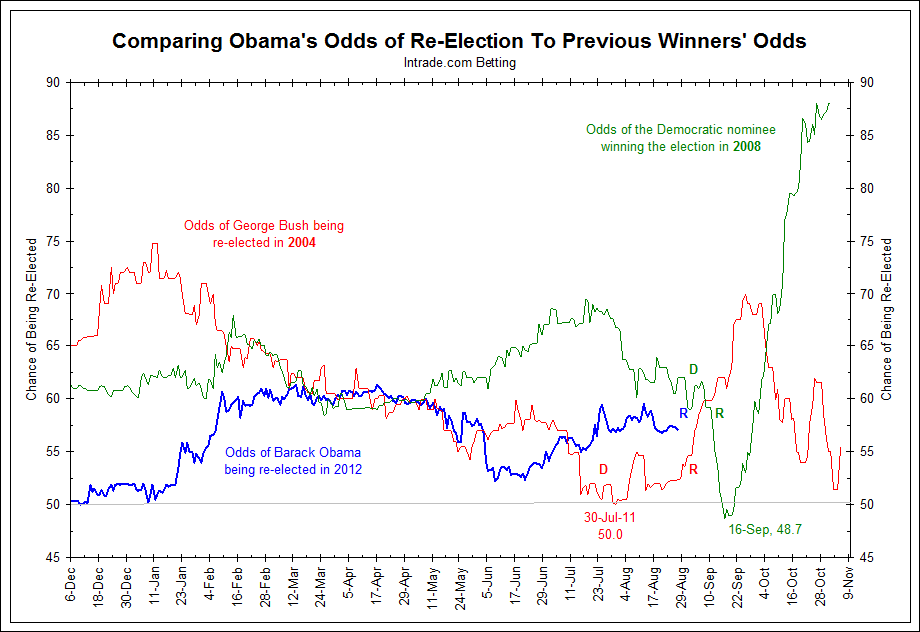Bloomberg.com – ECB Said to Await German ESM Ruling Before Settling Plan
European Central Bank President Mario Draghi may wait until Germany’s Constitutional Court rules on the legality of Europe’s permanent bailout fund before unveiling full details of his plan to buy government bonds, two central bank officials said. With the court set to rule on Sept. 12, investors looking for Draghi to announce a definitive purchase program at his Sept. 6 press conference might be disappointed, according to the officials, who spoke on condition of anonymity because the deliberations are not public. The program is still being worked on and staff may not be able to finalize it by then, said the officials, who are familiar with thinking on the ECB Governing Council. An ECB spokesman in Frankfurt declined to comment.
Bloomberg.com – Dutch Elections Risk Muddying Merkel’s Crisis-Fighting Efforts
Next month’s Dutch elections risk complicating Europe’s efforts to resolve its debt crisis, with the coalition government that emerges likely to reflect both anti-European sentiment and resistance to more austerity. A third of Dutch voters in the run-up to the Sept. 12 vote back the Socialists, who oppose more spending cuts and refuse to hand over more sovereignty to Europe, or the Freedom Party, which seeks an exit from the European Union and the euro. That will make it tough for caretaker Prime Minister Mark Rutte’s Liberals to find support from perhaps three or four parties for a majority in parliament and keep cutting the deficit.
Comment
The quiet summer is about to give way to a three week period that will settle a lot of things. Consider:
Right now the odds of Obama winning the election are 57% on Intrade. According to Gallup, his approval rating is still below 50. So while he is leading, it is not a comfortable lead.
Next week is the Republican convention (starts Monday in Tampa, which is now under a hurricane watch). A week after that is the Democratic convention. If history is a guide (see the “D” and “R” on the chart below), a week after the last convention we should expect to see one of the candidates take a more commanding lead in the polls.
Click to enlarge:
- On August 31 Bernanke speaks in Jackson Hole. The Federal Reserve always tells us nothing ofpolicy substance will be in the speech. Last year Bernanke laid out Operation Twist and two years ago he laid out QE2. So, we’ll see.
- On September 6 the ECB governing council meets. Draghi was expected to detail his “whatever it takes” bond purchase program. But, as the story above says, this might be put on hold until September 12 (below).
- On September 7 the always-important payroll report will be released.
- On September 12 the German court rules on the constitutionality of the eurozone’s permanent rescue fund. This ruling is critical to Europe.
- On September 12 the Dutch election could have big implications on all of Europe, as noted above.
- The September 12/13 FOMC meeting is shaping up as the make-or-break moment for QE3. At this meeting the FOMC members update their forecasts and Bernanke holds a press conference. These events lend themselves well to policy changes (adding QE3), which is another reason many expect action at this meeting. Additionally, the next meeting is not until late October and that is perceived to be too close to the election.
So on September 14 we will know a lot more than we know now. This is the anniversary of the Lehman bankruptcy and if the markets disappoint we can re-run that event a few weeks before an election all over again!
Source: Bianco Research
The Financial Times – Gillian Tett: Don’t be fooled by short-selling bans
If a new paper published in a report from the Federal Reserve Bank of New York is correct, the answer is sobering. In recent months, a group of Fed and independent economists have analysed the impact of the short selling ban that was put into place in the US during the financial crisis of 2008, between September 22 and October 8 that year.* Those 2008 conditions are not necessarily identical to those currently prevailing in the eurozone. But the conclusions from the research are clear; these economists do not think short selling bans work. For there is precious little evidence that the ban in US markets truly halted share price declines; on the contrary, the impact was (at best) neutral, they claim. However, the ban hurt market mechanisms, as liquidity dried up.
Comment
We have been arguing this point for years:
While naked short-selling has always been illegal in the U.S., short-selling of all types was banned in the U.S. from September 19, 2008 to October 8, 2008 on select financial stocks. As the chart below shows, those restricted stocks dropped 26.3% in value during the U.S. short-selling ban. During the same period, the S&P 500 dropped 21.42%.
Click to enlarge:
Source: Bianco Research




What's been said:
Discussions found on the web: